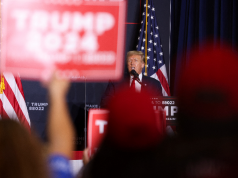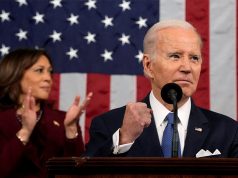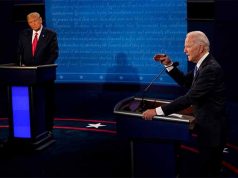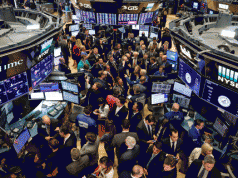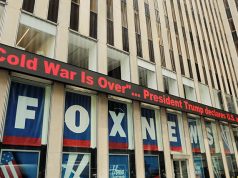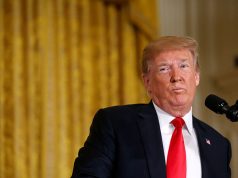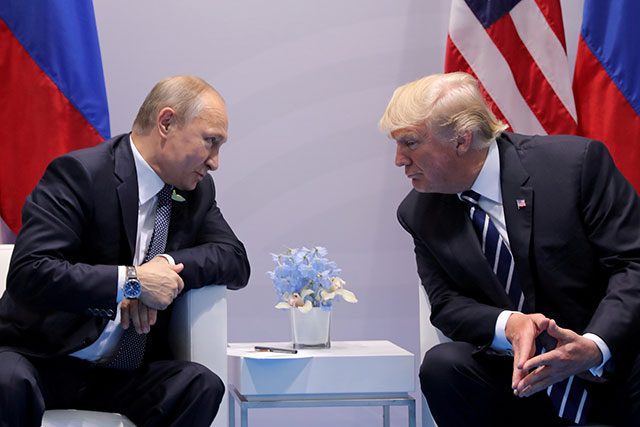
WASHINGTON- U.S. President Donald Trump and Russian President Vladimir Putin will meet for their first summit on July 16 in Helsinki, a venue famed for its Cold War diplomacy.
The Kremlin and the White House simultaneously announced the place and date a day after reaching agreement for the two leaders to meet following a visit to Moscow by U.S. national security adviser John Bolton.
Trump will meet Putin after attending a July 11-12 summit of NATO leaders and a visit to Britain. The date will give Putin a chance to attend the July 15 closing ceremony of the soccer World Cup hosted by Russia.
The two leaders have met twice before on the sidelines of international gatherings and spoken at least eight times by phone. They have also made positive comments about each other now and then with Putin lauding Trump’s handling of the U.S. economy.
The summit could irritate U.S. allies, such as Britain, who want to isolate Putin, or countries such as Ukraine who are nervous about what they see as Trump’s overly friendly attitude towards the Russian leader.
It is also likely to go down badly among critics who question Trump’s commitment to the NATO alliance and who have been concerned about his frictions with longtime allies such as Canada and Germany over trade policy.
“The president is pursuing this meeting in the interest of national security and to determine whether Russia is willing to make progress in our relationship,” White House spokeswoman Lindsay Walters told reporters aboard Air Force One, adding that Trump hoped it would “help reduce tension.”
Relations between Washington and Moscow became the most strained since the end of the Cold War during the administration of President Barack Obama who imposed sanctions for Russia’s annexation of Crimea from Ukraine. U.S. intelligence agencies accused Russia of interfering in the 2016 U.S. election, an allegation Moscow has repeatedly denied.
The summit is also boost for Finland, whose capital hosted major Cold War summits between leaders such as Leonid Brezhnev and Gerald Ford in 1975, and Mikhail Gorbachev and George H.W. Bush in 1990, as well as a meeting between Boris Yeltsin and Bill Clinton in 1997.
Moscow hopes the Helsinki summit will restart a dialogue between Washington and Moscow, said Vassily Nebenzia, the Russian ambassador to the United Nations.
“We need each other, not because we want to love each other. We don’t want and we don’t need to be loved. We simply need to hold normal, pragmatic relations with a major country upon which – like what lies upon us – a lot in the world depends,” Nebenzia told a news conference at the United Nations.
Nebenzia said he expects the summit to primarily focus on U.S.-Russia relations, but that “we will not be able to avoid” the civil war in Syria, the 2015 international accord on Iran’s nuclear program, which Trump has repudiated, and the Ukraine crisis.
U.S. Senator Lindsey Graham of Trump’s Republican Party, said he hoped Trump would raise Russia’s conduct in southwestern Syria where Syrian government forces have been battling rebels in a “de-escalation zone” agreed last year by the United States, Jordan and Russia to curb fighting.
“The question is are we going to let Putin walk all over us? Had eight years of that, kind of tired of it,” said Graham, who serves on the U.S. Senate’s Armed Services committee.
NATO Secretary-General Jens Stoltenberg played down worries about the summit saying it was in line with the alliance’s own policies which advocated dialogue with Moscow.
Others were less sanguine.
“There is unease about this meeting, just as there is unease about Trump,” said one senior NATO diplomat, who declined to be identified because of the subject’s sensitivity.
“What is he going to say, what is his preparation, is he aware of the symbolism? U.S. containment of Russia is going further than Europe would want … but if Trump then strikes up a friendship with Putin, it could leave us more in the dark about U.S. policy,” the diplomat said.
Daniel Fried, a former U.S. Assistant Secretary of State for European affairs, said allied leaders are worried that Trump will repeat at the NATO summit what occurred earlier this month at the G7 in Canada, when tensions over trade policy erupted and Trump declined to sign the leaders’ closing statement.
“What people are worried about is the president going into this meeting (with Putin) with a weaker hand if he is seen as blowing up alliances and not having a very good trip to London,” said Fried, now at the Washington-based Atlantic Council.
LOW EXPECTATIONS
Ukraine wants Russia to return the annexed Crimea region and wants pro-Russian separatists in eastern Ukraine to hand back control of territory. The White House’s Walters said she did not know if Trump would press Putin on the issue.
The Ukrainian presidential administration did not reply to a request for comment, but political analysts there said Russia was unlikely to consider a deal on Ukraine until after Ukrainian presidential and parliamentary elections next year.
“There will be no sensational results,” said Volodymyr Fesenko, a Ukrainian political analyst. “At the moment there are no obvious preconditions for any kind of compromise.”
Trump has long expressed a desire for better relations with Russia, even as Washington tightens sanctions against the country, and the Kremlin has long pushed for a summit.
Moscow made no secret on Wednesday of its delight that such a meeting had finally been agreed with Kremlin aide Yuri Ushakov saying on Wednesday that the two men were likely to talk for several hours. He spoke of a possible joint declaration on improving U.S.-Russia relations and international security.
Trump congratulated Putin by phone in March after the Russian leader’s landslide re-election victory, even though opposition activist Alexei Navalny was barred from running.
But since then, already poor ties between Washington and Moscow have deteriorated over the conflict in Syria and the poisoning of a former Russian spy in Britain, which prompted expulsions of diplomats from both countries.
Expectations for a Trump-Putin summit are therefore low.
The U.S. Special Counsel, Robert Mueller, has indicted Russian firms and individuals as part of a probe into possible collusion between Russia and Trump’s 2016 presidential campaign. Trump denies wrongdoing and calls the investigation a “witch hunt”.
Bolton told reporters in Moscow on Wednesday he expected Russian interference in U.S. politics to be discussed at the summit.
‘SMALL STEPS’
“Even small steps in reducing tensions would be in everybody’s interest,” remarked Finnish President Sauli Niinistö, who said he hoped Putin and Trump would discuss arms control and heed his own concerns about tensions in the Baltic Sea region.
After Trump and Putin met briefly in Vietnam in November 2017, Trump was criticized in the United States for saying he believed Putin when the Russian president denied Russian meddling.
In a Twitter post on Thursday before the Helsinki meeting was announced, Trump again appeared to cast doubt on Russian involvement. “Russia continues to say they had nothing to do with Meddling in our Election!” he wrote.
In Washington, the tweet drew rebukes from Democratic politicians and at least one of Trump’s fellow Republicans.
“Of course #Putin continues to deny interfering in our elections. But he did. That is not a matter of opinion, it is an indisputable FACT,” Republican Senator Marco Rubio wrote.
Democrats said the meeting was a gift to the Kremlin and worried what else Trump might give away.
In Moscow, Russian Foreign Ministry spokeswoman Maria Zakharova said it was best not to get too excited about what the summit might yield.
“In general, I’d recommend everyone not to use phrases like ‘breakthroughs’ and such like,” the RIA news agency quoted her as saying. “I suggest taking quite a pragmatic and realistic view of these meetings.” –Additional reporting by Denis Pinchuk and Maria Kiselyova in Moscow, Robin Emmott in Brussels, Alessandra Prentice in Kiev, Stine Jacobsen in Helsinki, Jeff Mason aboard Air Force One, Jonathan Landay, Richard Cowan in Washington; Writing by Doina Chiacu, Andrew Osborn and Mary Milliken; Editing by Frances Kerry, William Maclean, Andrew Heavens, Grant McCool




